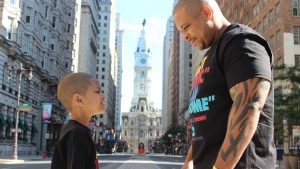Bringing Autism Fathers Together

As fathers to children with autism, Mike Dempsey and Jamiel Owens agree that every family in their situation faces unique difficulties in their journey. They also agree that there is one rock-solid truth for every dad who cares for a child with autism: It’s a challenge that no father should try to shoulder alone.
“The notions we have of fatherhood in this country absolutely do not work for a father of a child with autism,” Owens said. “If you follow that old model you will fail miserably. It’s okay to lean on others. In fact, you have to lean on others.”
Dempsey said there is a special connection that fathers form with each other once they are able to discuss their experiences.
“As a dad to a daughter with autism, I can share things with other dads that I can’t with anyone else,” Dempsey said. “You can relate to other dads and talk about experiences you’ve been through, and it helps to have people who can listen and relate to you.”
To help facilitate connection, learning, and support for fathers of children with autism, the UNC Autism Research Center is hosting the third annual UNC Autism Fathers Conference on April 30, 2022, on Zoom. The virtual event will feature expert speakers with useful insight into raising children with autism.
UNC Autism Fathers Conference
When: April 30, 2022 11am to 1:15pm ET
Where: Zoom conference, register here
Session 1: A conversation between Robert Naseef, PhD, and Michael Hannon, PhD, fathers of autistic children who co-facilitate a fathers’ group at Drexel University. Moderated by award-winning broadcaster Dwayne Ballen.
Session 2: Panel discussion and Q&A. Moderated by Dwayne Ballen.
Dr. Joe Piven, professor of psychiatry and pediatrics and director of the Carolina Institute for Developmental Disabilities, works with many families who have children with autism. He’s found that when he reaches out to families to help with research, often the fathers are less engaged. The conference is a way to encourage fathers to play more active roles in all aspects of their children’s lives.
Both Dempsey and Owens say that raising their children brought a sense of purpose to their lives, and helped them become more thoughtful and compassionate people.
Dempsey’s daughter, Kellie, a 19-year-old student at Wake Technical Community College, is considering a career in counseling to help children with special needs. Kellie is a talented writer, and she and her father hosted a two-season, 24-episode webcast that featured star athletes like Johnny Damon, Doug Flutie, and Tim Tebow.
As Kellie enters adulthood, Dempsey says he has a lot of experience and know-how that he can share with other fathers and parents.
“My job was to be her advocate,” Dempsey said. “I had to be an advocate for her skills and her abilities and her needs. I had to learn the school handbook on individualized education plans, and what the schools needed to do for her. And I made sure she got everything.”
Owens described feeling anger and fear when his son, Shayne, was diagnosed, but that caring for Shayne catapulted him out of his masculine shell. Owens now describes himself as an educator for other fathers. He has authored four books, written countless articles, and hosted a podcast series about his and Shayne’s journey.
Shayne, 13, is an excellent student who arrives at class early so he can greet his classmates with a smile.
“Shayne is an awesome, amazing young man who is full of life and very excited to learn and follow his passions,” Owens said. “His teachers say that he brightens up everyone’s day.”
Owens says he hopes he can help other fathers discover the same sense of purpose and positivity that he found through being Shayne’s dad.
“My job here on this planet is to help pull men together and help lift them up so that they don’t have to go through the battles I went through after my son’s diagnosis,” Owens said.